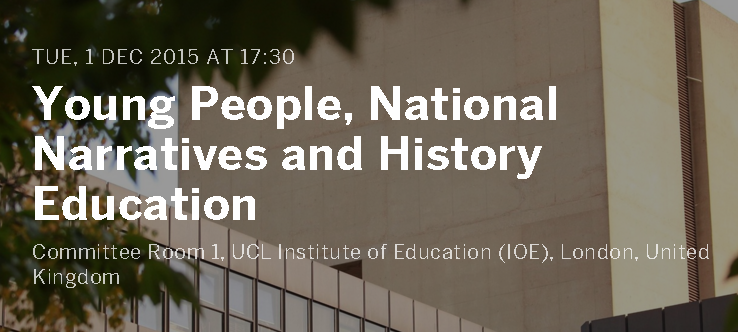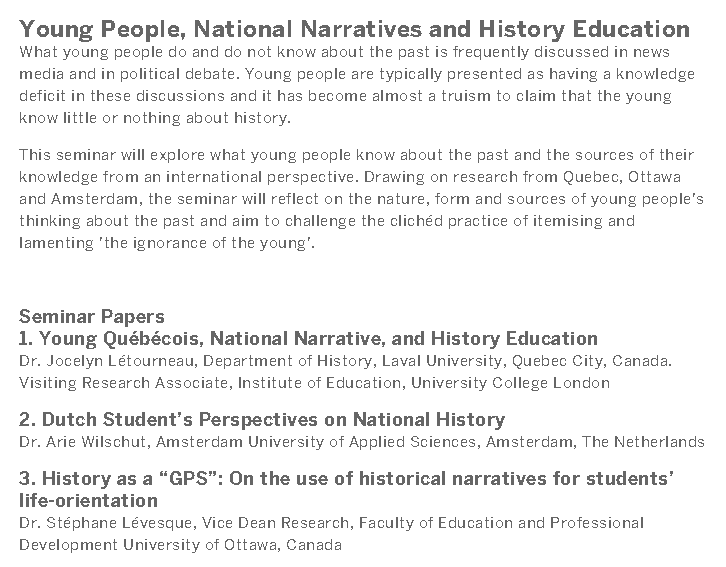Is a Little Knowledge a Dangerous Thing? Young People, National Narratives and History Education
26 November 2015 - 10:07am
Professor Jocelyn Létourneau, Department of History, Laval University
Dr Arthur Chapman, UCL IoE
Anxieties about national identity and its strengthening and preservation are common in countries around the world, and it is, of course, entirely natural that this should be so in times of great change, challenge and uncertainty.
These anxieties can cause our discussions of history education to tend to the negative and to become counter-productive and even irrational. Public discussion tends, first, to base itself on impressionistic surveys – hardly fitting for matters of consequence. Second, it tends to focus on deficits – on what children do not know. Finding the same absence – repeatedly – is not a constructive act (we learn nothing new by doing it) and, more importantly, a focus on what is not present tells us nothing about what is in children’s heads. Understanding the ideas that children do have is crucial if we want to help them build historical knowledge and understanding and it is more important to know how children think about the past than it is to know which particular fact they do or do not know. Finally, as Sam Wineburg has shown, the habit of repeatedly finding that children know less than they used to has a long history – the obsessive repetition of claims about children’s ignorance of the past generation after generation is evidence of continuity more than change.

What happens if we try and find out what children do know and if we try to do so in a sustained manner and on a large scale?
In the last decade, scholars in a number of places around the world - including this Institute, Quebec, Canada, France, Switzerland (Geneva), Germany, Spain, Australia, and Belgium – have begun to undertake large-scale studies of what young people know about the past.[1] Rather than posing fastidious questions on specific historical issues (such as “Who was Horatio Nelson?”), which usually prove young people’s lack of knowledge, many of these studies invite students to tell what they know (“Tell me the story of your country, as you know it, from the beginning to the present”). With no constraint on their answers other than an injunction to be serious in responding to the task, most students were able to propose some sort of narrative in the 45 minutes allotted for the task. These narratives often revealed that students had meaningful knowledge and representations about their nation and that they were not ‘empty pots’.
To exemplify, here are some extracts from narratives produced by young people in different countries in response to questions that take this constructive approach.
Quebec The English win the war [of the Conquest, 1759] but the French remain despite the contempt of the British; the French people hold their ground and fight for their rights.
France Gauls – Hundred Year’s War - Romans - François 1er - War - Louis XIII - President - Louis XIV – World Fair - Louis XV - Charlemagne - Louis XVI - Hugues Capet - Charles De Gaulle - Clovis - Jacques Chirac - Vase de Soissons - François Mitterrand - Jean Moulin – Storming of the Bastille – Colonial wars – July 14th – Simone Veil - Galilée – Women’s suffrage - Copernic - Olympe de Gouges - Van Gogh – Middle Age - Verdun – Napoleon wars - Napoleon - Musketeers - Richelieu - Republic - Democracy - Marie Curie - May 1968 - Antoine de Saint Exupéry - Louis Pasteur - Marie Antoinette – Normandy landings – German occupation – June 1944 – Vichy Regime – The 30 glorious - The 20 miserable – World Cup 1998.
England A glorious past which we should be proud. Doing the right thing in standing up to aggression in the last century cost our nation dearly in lifes and economically. Apologies for having an empire and political correctness and short sightness after the second world war diminished our nation economically and militarily. However our gift to most of world being democracy and the rule of law means we still have standing in the world.
Scotland A bloody struggle for freedom.
Wales Resisted invasions from Romans. Kept strong identity. Fortune came from coal. Industry dwindled. New opportunities for growth.
It would be easy to criticise such accounts – to quibble about detail or to point to deficiencies in narrative organisation or historical structure and there is certainly a place for such an analysis. But to look for what is not present is to miss what is clearly staring us in the face. These young people are able to make meaning through their historical narratives.
These responses do show, for example, that the students who wrote them
- know things about the past;
- can use what they know to make meaning from the historical information circulating in their societies; and
- use their knowledge of history for personal and practical purposes (making sense of their lives in the social or national contexts which remain an important reference point for them.
The quotations also tell us something about the sources of young people’s knowledge, drawing as they do on national myths and popular stories about the past to organize their historical thinking.
We need to know more about what children do know, where this knowledge comes from and how their knowledge is structured if we are to engage them in the study of history and understand how to help them learn more history. Positive questions that call for children to share their thinking are more likely to help us in these tasks than negative ones that seek to sound out gaps. To identify gaps and argue for traditional didactic teaching that imposes a canon, as policy makers often do, is unhelpful. If we give children a chance to share what they do know then we learn something about what their motivations and interests are – effective teaching always needs to consider, rather than ignore, learners’ motivations. If we give children a chance to share what they do know then we learn something about how children organise what they know or, in other words, about the nature of their narrative competence. To try and impose a canon without thinking about how children make sense of stories about the past is rather like trying to farm simply by scattering seed, without paying attention to the nature of the soil or thinking about how to prepare and manage it.
We are holding a symposium here at the UCL IoE on December 1st to discuss precisely these issues and a special edition of the London Review of Education that aims to gather together robust international research evidence on the forms, origins and nature of children’s knowing is in preparation for 2017. Understanding more about what young people know and about what makes history meaningful for them will, we hope, help to address some of the anxieties that perplex us all.

[1] For Swiss, Germany, France and Spain see the Lantheaume, F., and Létourneau J. (2016). Le récit du commun. L’histoire nationale racontée par les élèves. Approche comparative: France, Catalogne, Suisse, Allemagne, Lyon: Presses universitaires de Lyon. Belgian work is currently in process.
- Se connecter ou créer un compte pour soumettre des commentaires

